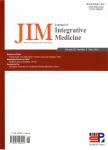Integration for coexistence? Implementation of intercultural health care policy in Ghana from the perspective of service users and providers
Integration for coexistence? Implementation of intercultural health care policy in Ghana from the perspective of service users and providers作者机构:Department of Sociology and Social Policy Faculty of Social Sciences Lingnan University Hong Kong China Department of Geography and Rural Development Faculty of Social Sciences Kwame Nkrumah University of Science and Technology Kumasi Ghana Department of Geography Education Faculty of Social Science Education University of Education Winneba Ghana Department of Planning and Development Christian Service University College Kumasi Ghana
出 版 物:《Journal of Integrative Medicine》 (结合医学学报(英文版))
年 卷 期:2017年第15卷第1期
页 面:44-55页
核心收录:
学科分类:1004[医学-公共卫生与预防医学(可授医学、理学学位)] 1002[医学-临床医学] 10[医学]
基 金:the Council for the Development of Social Science Research in Africa (Grant number.SGRT.46/T12) the Institute for Research in Africa (IFRA-Nigeria) the French Embassy in Ghana for providing financial support for the study (these scholarships were offered to the first author)
主 题:intercultural health care policy interview perspectives integrative medicine Ghana
摘 要:OBJECTIVE: In spite of the World Health Organization's recommendations over the past decades, Ghana features pluralistic rather than truly integrated medical system. Policies about the integration of complementary medicine into the national health care delivery system need to account for individuallevel involvement and cultural acceptability of care rendered by health care providers. Studies in Ghana, however, have glossed over the standpoint of the persons of the illness episode about the intercultural health care policy framework. This paper explores the health care users, and providers' experiences and attitudes towards the implementation of intercultural health care policy in Ghana. METHODS: In-depth interviews, augmented with informal conversations, were conducted with 16 health service users, 7 traditional healers and 6 health professionals in the Sekyere South District and Kumasi Metropolis in the Ashanti Region of Ghana. Data were thematically analysed and presented based on the a posteriori inductive reduction approach. RESULTS: Findings reveal a widespread positive attitude to, and support for integrative medical care in Ghana. However, inter-provider communication in a form of cross-referrals and collaborative mechanisms between healers and health professionals seldom occurs and remains unofficially sanctioned. Traditional healers and health care professionals are skeptical about intercultural health care policy mainly due to inadequate political commitment for provider education. The medical practitioners have limited opportunity to undergo training for integrative medical practice. We also find a serious mistrust between the practitioners due to the "diversity of healing approaches and techniques." Weak institutional support, lack of training to meet standards of practice, poor registration and regulatory measures as well as negative perception of the integrative medical policy inhibit its implementation in Ghana. CONCLUSION: In order to advance any useful intercultural health care policy in Ghana, the government's total commitment in informed training and provider education, enforcement of regulatoryinstrument and improved community engagement is needed. Evidence-based incorporation of traditional medical therapies into clinical practice will provide safer, faster and more effective health care for the underserved and resource-poor, particularly in the rural areas.



